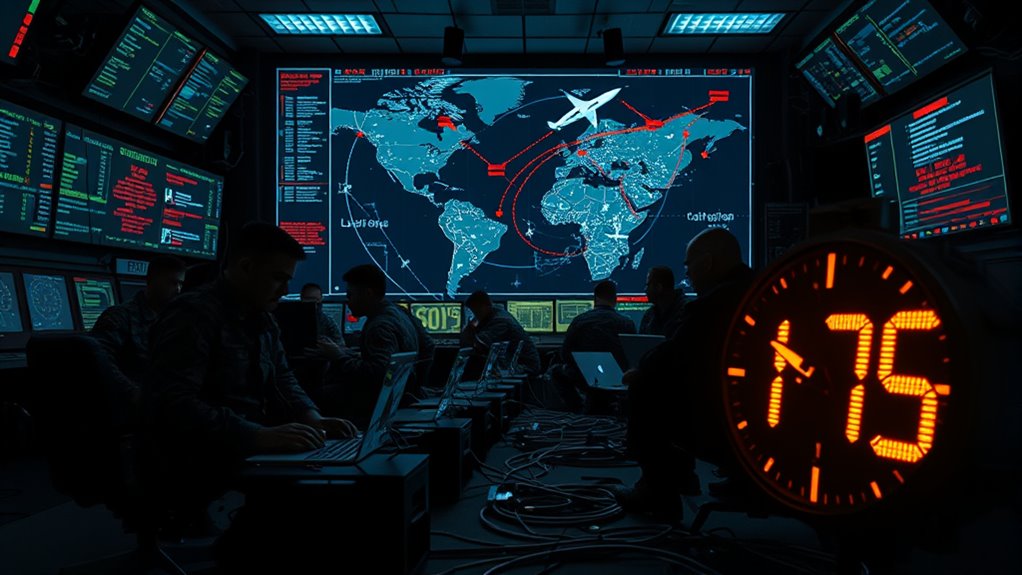The recent breach of a U.S. Army intelligence unit by a Chinese hacking group highlights the growing danger to national security. This group aimed to steal sensitive hypersonic technology secrets, showcasing the ongoing cyber threat from adversaries like China's PLA Unit 61398. Their activities can significantly jeopardize military readiness and operational capabilities. It's crucial to stay informed about how these cyberattacks impact defense systems and what steps are being taken to counteract these threats.
Key Takeaways
- A recent breach of a U.S. Army intelligence unit exposed vulnerabilities to cyberattacks, particularly from Chinese hacking groups.
- PLA Unit 61398 is linked to the cyberattack, targeting sensitive military secrets, especially hypersonic technology.
- Chinese cyber activity has been a persistent threat since the early 2010s, with ongoing espionage efforts to gain military advantages.
- The U.S. has implemented enhanced cybersecurity measures and legal frameworks to counteract state-sponsored hacking and protect military operations.
- Compromised data from military systems can disrupt U.S. operational capabilities and jeopardize national security in the evolving cyber conflict.

As the threat of cyberattacks looms larger, a recent breach of a U.S. Army intelligence unit underscores the serious vulnerabilities facing military and defense systems. Chinese hacking groups, particularly the notorious PLA Unit 61398, have been linked to a series of cyberattacks aimed at stealing sensitive military secrets. Your understanding of this situation is crucial, as it reveals the ongoing battle between nations in the cyber domain.
These attacks are often focused on acquiring critical information related to advanced weapon systems, with a specific emphasis on hypersonic technology. This interest highlights a strategic goal: obtaining cutting-edge military capabilities that could shift the balance of power. By targeting the U.S.'s most sensitive military data, these groups not only threaten national security but also pose long-term risks to military operations.
Historically, Chinese hacking activity has been persistent, dating back to the early 2010s. A 2013 report by Mandiant connected PLA Unit 61398 to extensive cyber espionage against U.S. corporations and government entities. U.S. intelligence agencies have consistently flagged China's cyber capabilities as a major threat, emphasizing that these attacks often serve dual purposes—commercial gain and military advantage. The average intrusion duration of these cyberattacks can last for extended periods, with some incidents stretching nearly five years.
Unit 61398 operates from a Shanghai-based hub, employing sophisticated techniques that allow them to evade detection. Despite clear evidence of their involvement in cyber espionage, China continues to deny any participation in these attacks. The global impact of their activities extends beyond U.S. borders, affecting various industries and governments worldwide.
In response, the U.S. has taken significant steps to deter future attacks. Indictments against Chinese hackers have been issued, leading some groups to reconsider their tactics. Enhanced cybersecurity measures are being implemented to protect vital military and defense systems, while international cooperation is becoming increasingly important in combating these threats. Legal frameworks are also being developed to address the issue of state-sponsored hacking more effectively.
The implications of these cyberattacks on U.S. military operations are profound. They pose significant threats to critical infrastructure and can disrupt military readiness. The theft of military secrets can compromise not only national security but also the operational capabilities of the U.S. armed forces.
Cyberattacks threaten U.S. military readiness, compromising national security and operational capabilities.
You should keep a close eye on this evolving landscape, as the stakes are incredibly high in the ongoing cyber conflict.
Frequently Asked Questions
What Are Hypersonic Weapons and Their Significance?
Hypersonic weapons are advanced armaments that travel at speeds exceeding Mach 5, making them extremely difficult to intercept.
They come in two main types: hypersonic glide vehicles and hypersonic cruise missiles.
Their significance lies in their ability to evade current defense systems, offering rapid and precise strikes, which enhances strategic deterrence.
As countries invest heavily in their development, the challenges of heat management and detection remain key areas of focus in this technological race.
How Can Cyber Attacks Impact National Security?
Cyber attacks can severely impact national security in various ways. They can compromise sensitive data, disrupt military operations, and facilitate espionage, weakening your country's defenses.
You might also see economic repercussions, as cybercrime costs billions and erodes public trust in institutions.
Additionally, cyber attacks can influence public opinion through disinformation campaigns, creating further instability.
To safeguard national security, you must prioritize robust cybersecurity measures and international cooperation.
What Are the Implications of Foreign Espionage on Military Technology?
When you play with fire, you might get burned. Foreign espionage on military technology can seriously compromise national security.
It exposes sensitive information, giving adversaries insights that can undermine your nation's strategic advantage. This not only jeopardizes operations but can also erode trust among allies and military personnel.
Ultimately, it shifts the balance of power, risking both economic stability and technological progress, creating a landscape where innovation and security are perpetually threatened.
What Measures Can Be Taken to Prevent Future Hacks?
To prevent future hacks, you should prioritize regular cybersecurity training for all personnel, focusing on recognizing phishing attempts and social engineering tactics.
Implement multi-factor authentication across systems and encourage the use of VPNs for secure communications.
Regularly assess risks and update software to close vulnerabilities.
Establish clear incident reporting procedures so you can respond quickly to any breaches.
Lastly, ensure everyone understands their role in maintaining a security-first mindset.
How Does This Incident Compare to Previous Cyber Attacks on the Military?
When you compare this incident to previous cyber attacks on the military, you'll notice similarities in tactics and targets.
Just like the OPM breach or the SolarWinds attack, this incident highlights vulnerabilities in sensitive systems.
Each attack emphasizes the need for robust cybersecurity measures and continual vigilance.
As threats evolve, understanding these patterns helps you anticipate and mitigate future risks, ensuring national security remains a top priority in an increasingly digital battlefield.
Conclusion
As shadows of cyber warfare loom larger, the breach of the U.S. Army intel unit serves as a stark reminder that the battlefield has shifted to the digital realm. Like a thief in the night, the Chinese hacking group slipped through defenses, weaving a web of espionage that threatens national security. It's a wake-up call for vigilance; the race for hypersonic secrets isn't just a sprint—it's a relentless marathon where every second counts. Stay alert, stay secure.








